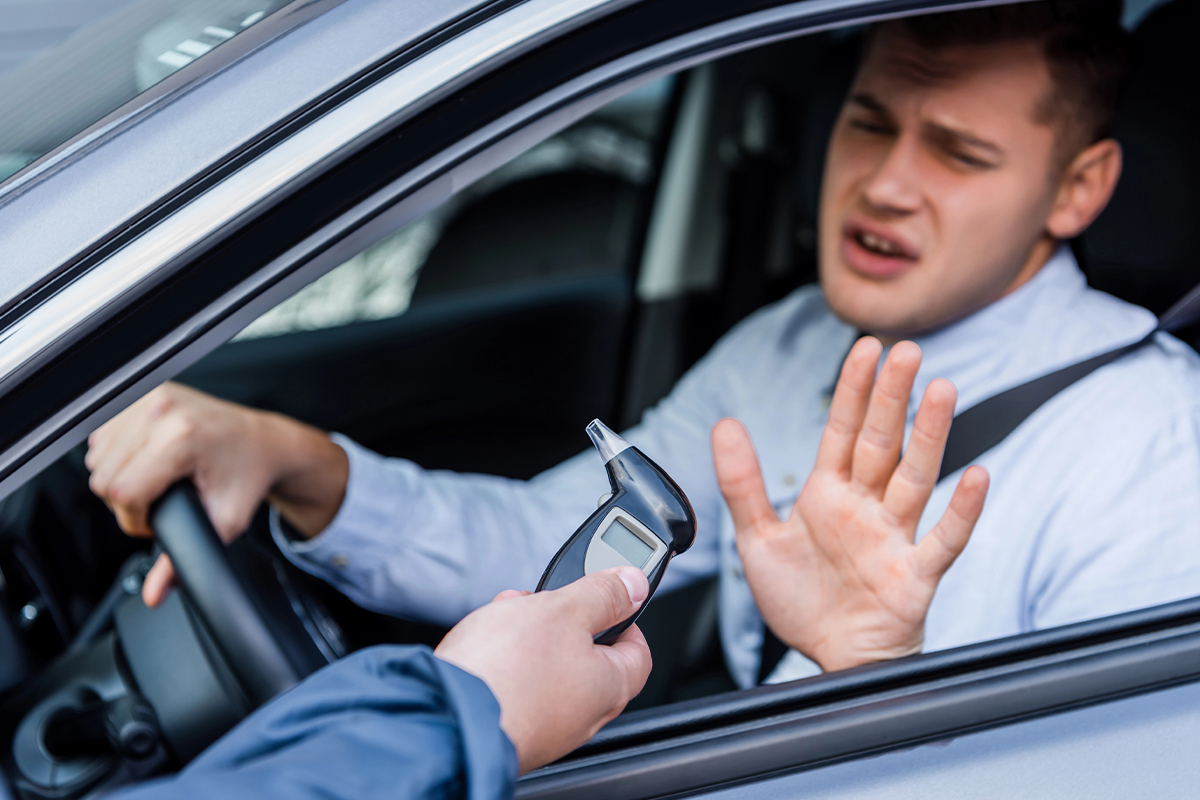If you are facing failure or refusal to comply charges, you need a criminal defence lawyer in Calgary to look at your case as soon as possible.
Failure or refusal to comply with a breath demand is a serious driving offence in Canada. This happens when a police officer lawfully asks you to provide a breath sample during a traffic stop, and you refuse or fail to provide it without a reasonable excuse.
More specifically, this is when someone fails or refuses to comply with a demand to provide a breath sample, blood sample, or perform physical coordination tests when an officer has reasonable grounds to suspect impaired driving. In cases where impaired driving is an issue, you can also consult our resource on Impaired Driving and DUI Lawyers in Calgary for further insights.
This is a hybrid offence, which means the Crown prosecutor can choose to treat it as either a summary or indictable offence depending on the circumstances. The penalties are the same as for impaired driving because refusing a breath test is treated just as seriously as failing one.
Strategic Criminal Defence is a top Google-rated criminal defence firm in Calgary, with over 500 5-star reviews. Our firm, and our experienced legal team, have defended clients in over 10,000 criminal cases. Leveraging our extensive network of lawyers and decades of experience, we craft defence strategies to help those accused of failure or refusal to comply beat the charge. For a deeper look at how our team handles such cases, you may wish to explore our page on Failure or Refusal to Comply with a Demand Lawyers Calgary.
The lawyers at Strategic Criminal Defence are both highly experienced and dedicated to defending your rights and future in the face of these charges. Contact a lawyer today by calling (403) 719-6410.
Key Takeaways
- You are breaking the law if you don’t give the police a breath sample when they lawfully ask you for one.
- If you don’t take a breath test, the law treats it the same as failing one. The punishments are the same as those for impaired driving.
- This is a hybrid offence with minimum punishments of $2,000 for first offenders, 30 days jail for second offenders, and 120 days jail for third offenders.
- Maximum penalties can reach 10 years’ imprisonment, or 14 years if the refusal happened in a case involving bodily harm.
- Depending on how many times you have been found guilty of this offence before, you will also be prohibited from driving for at least one to three years.
- People who are out on bail for this offence usually have to check in with the police often, not drink, and not drive. For more guidance regarding bail issues, see our discussion on Bail Lawyers in Calgary.
- If you had a good reason not to give a sample or the police didn’t follow the rules, you can beat these charges with the right legal defence.
- Defences may include not being able to give a sample because they were sick, the police asked for it in an illegal way, or their Charter rights were broken.
How Our Lawyers Help With a Failure or Refusal to Comply Charge
Having a Strategic Criminal Defence lawyer on your side is very helpful when facing charges for failure or refusal to comply with demand for a breath sample.
- We can help from the very start, before charges are filed, we can help figure out your next steps. We can also begin documenting any health problems you have that may have added to the reason for your refusal.
- Part of our assistance is collecting vital evidence. We can look for evidence for your defence from police reports, police video, medical documents and your statements.
- We can hire professionals, such as doctors or toxicologists, to talk about things that may have made it hard for you to give a good sample.
- Our lawyers will help you navigate the complexities of the criminal justice system, including court appearances and disclosure reviews. Additionally, if your case escalates to a full trial, you might find our explanation of the Criminal Trial Process in Calgary helpful.
Examples of Failure or Refusal to Comply Charges
If you do any of the following in Calgary, you could be charged with Failure or Refusal to Comply:
- When a police officer stops a speeding car, they can smell alcohol on the driver. The officer can ask for a breath sample on the side of the road, but the driver won’t blow into the screening device and says they “know their rights” and won’t take any tests. If you say no without a good reason, you could be charged under section 320.15.
- The police ask the driver for a breath sample after a small accident. The driver agrees, but then they keep pretending to blow without giving the device enough air to get a reading. The officer tries a few times and decides that this is a deliberate failure to comply.
- A driver who is stopped at a check stop and asked to give a breath sample says they just brushed their teeth and want to wait 15 minutes. The driver keeps making excuses, and when the officer agrees to wait, the driver finally says no. This pattern of delay and refusal kept up, and charges were filed.
Consequences of a Failure or Refusal to Comply Charge
If you refuse to take a breath test, the law treats it the same as failing one, and the same punishments apply.
- Refusal to comply is a hybrid offence, which means that the Crown prosecutor can choose to go ahead with either a summary conviction (for less serious cases) or an indictment (for more serious cases). This choice will change the punishments you could get.
- You will have to pay at least $2,000 for your first offence. If you commit the offence again, you have to spend at least 30 days in jail. If you have committed three or more failure to comply offences, you must spend at least 120 days in jail.
- If you are convicted of a summary offence, you could spend up to two years in jail. The longest sentence that can be given if the case goes to trial is 10 years in prison. If the refusal happened after an accident that hurt someone, the maximum sentence goes up to 14 years.
- In addition to going to jail and paying fines, you will also lose your ability to drive.
A conviction also gives you a criminal record that can make it harder to find work, especially if you have to drive. It can also make it hard to travel to other countries.
Failure or Refusal to Comply Charge Defences
It’s scary to be charged with refusing to give a breath sample, but there are some legal defences that could help your case. We will look at the details of your case to see what defences might apply to you.
If you are charged with Failure or Refusal to Comply, here are some ways you might be able to defend yourself:
- Medical Conditions: If you have severe asthma, COPD, or emphysema, you might not be able to blow hard enough or long enough for a breathalyzer to pick it up. Other problems could also be teeth issues, cuts or bruises in your mouth, or surgery that you just had on your mouth.
- Communication: You might have a defence if the officer didn’t explain what was needed clearly, or used language that was hard to understand. The court might say you didn’t knowingly refuse.
- Charter: If the police didn’t have a good reason to ask you to take a breath test in the first place, they may have violated your Charter rights. The court might throw out evidence or drop the case completely if it thinks the Charter has been broken in a significant way.
Failure or Refusal to Comply Charge Investigation
The officer will record everything that made them think someone had been driving while impaired, such as the smell of alcohol, slurred speech, red eyes, or bad driving. For insight into how these investigations proceed, you might also review our informative section on the Police Investigation Process.
- The officer will then record exactly what they said when they asked for the breath sample so that it is clear and easy to understand. T
- They will also write down what you said and why you didn’t give them a sample.
- The police might ask other officers or people who saw what happened to provide more evidence.
Bail Conditions for Failure or Refusal to Comply Charges
If you get arrested for not giving a breath sample and released on bail, there will be conditions that you have to follow.
- The most important condition will be that you can’t drive at all. Even if you haven’t been found guilty yet, the court usually won’t let you drive at all while you’re facing these charges.
- You will likely not be able to drink alcohol or take any non prescription drugs while on bail.
- You might also have to check in with a police station or bail supervisor on a regular basis. You will check in once a week or once a month to show that you haven’t left the area and are following the rules.
- If you want to move, you need to let the court know. You might need permission to leave the province first as well.
- You could be charged with breaking your bail conditions if you drink alcohol or drive while on bail. This is a different crime that could get your bail revoked, which means you would have to stay in jail until your trial.








